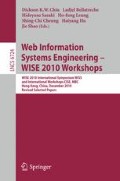Abstract
Despite the help of search engines and Web directories, identifying high quality content becomes increasingly difficult as the Internet gets ever more crowded with information.
Prior approaches for filtering and searching content with respect to user-specific preferences do exist: Recommendation engines employ collaborative filtering to support subjective selection, (semi-)automatic page ranking algorithms utilize the hypertext link structure of the World Wide Web to assess page importance, and trust-based systems employ social network analysis to determine the most suitable Web pages. The use of implicit and explicit user feedback, however, is often either ignored or its exploitation is limited to isolated Web sites. We thus propose a quality overlay framework that enables the collection and processing of user-feedback, and the subsequent presentation of quality-enabled content for any Web-site.
We present the quality overlay framework, propose an architecture for its realization, and validate our approach by scenarios and a detailed design with sample implementation.
Access this chapter
Tax calculation will be finalised at checkout
Purchases are for personal use only
Preview
Unable to display preview. Download preview PDF.
References
Abiteboul, S., Preda, M., Cobena, G.: Adaptive on-line page importance computation. In: WWW 2003: Proceedings of the 12th International Conference on World Wide Web, pp. 280–290. ACM Press, New York (2003), http://portal.acm.org/citation.cfm?id=775192
Adomavicius, G., Tuzhilin, A.: Toward the next generation of recommender systems: A survey of the state-of-the-art and possible extensions. IEEE Trans. Knowl. Data Eng. 17(6), 734–749 (2005)
Atkinson, R.C., Herrnstein, R.J., Lindzey, G., Luce, R.D.: Stevens’ Handbook of Experimental Psychology, 2nd edn. Wiley, New York (1988), http://nla.gov.au/nla.cat-vn1061642
Averbakh, A., Krause, D., Skoutas, D.: Exploiting User Feedback to Improve Semantic Web Service Discovery (8th International Semantic Web Conference, Chantilly, VA, OCT 25-29, 2009). In: Bernstein, A., Karger, D.R., Heath, T., Feigenbaum, L., Maynard, D., Motta, E., Thirunarayan, K. (eds.) ISWC 2009. LNCS, vol. 5823, pp. 33–48. Springer, Heidelberg (2009)
Brin, S., Page, L.: The anatomy of a large-scale hypertextual web search engine. Computer Networks and ISDN Systems 30(1-7), 107–117 (1998), http://citeseer.ist.psu.edu/brin98anatomy.html
Golbeck, J., Hendler, J.: Inferring binary trust relationships in web-based social networks. ACM Trans. Inter. Tech. 6(4), 497–529 (2006), http://portal.acm.org/citation.cfm?id=1183463.1183470
Lykourentzou, I., Papadaki, K., Vergados, D.J., Polemi, D., Loumos, V.: CorpWiki: A self-regulating wiki to promote corporate collective intelligence through expert peer matching. Information Sciences 180(1, Sp. Iss. SI), 18–38 (2010)
Miao, Q., Li, Q., Dai, R.: A unified framework for opinion retrieval. In: Web Intelligence, pp. 739–742. IEEE, Los Alamitos (2008)
Price, R., Shanks, G.: A semiotic information quality framework: development and comparative analysis. Journal of Information Technology 20(2), 88–102 (2005)
Sabater, J., Sierra, C.: Review on computational trust and reputation models. Artificial Intelligence Review 24(1), 33–60 (2005), http://portal.acm.org/citation.cfm?id=1057849.1057866
Schaal, M.: A Bayesian Approach for Small Information Trust Updates. In: Proceedings of IeCCS 2006 (2006)
Stvilia, B., Gasser, L., Twidale, M.B., Smith, L.C.: A framework for information quality assessment. JASIST 58(12), 1720–1733 (2007)
Wang, K., Lin, C.L., Chen, C.D., Yang, S.C.: The Adoption Of Wikipedia: A Community-And Information Quality-Based View. In: Huang, W., Teo, H.H. (eds.) 12TH Pacific Asia Conference on Information Systems (PACIS 2008), Suzhou, Peoples R China, July 03-07, pp. 248–259 (2008)
Wang, R.Y., Strong, D.M.: Beyond accuracy: what data quality means to data consumers. J. Manage. Inf. Syst. 12(4), 5–33 (1996)
Author information
Authors and Affiliations
Editor information
Editors and Affiliations
Rights and permissions
Copyright information
© 2011 Springer-Verlag Berlin Heidelberg
About this paper
Cite this paper
Schaal, M., Davenport, D., Cevik, A.H. (2011). Towards a Quality Service Layer for Web 2.0. In: Chiu, D.K.W., et al. Web Information Systems Engineering – WISE 2010 Workshops. WISE 2010. Lecture Notes in Computer Science, vol 6724. Springer, Berlin, Heidelberg. https://doi.org/10.1007/978-3-642-24396-7_24
Download citation
DOI: https://doi.org/10.1007/978-3-642-24396-7_24
Publisher Name: Springer, Berlin, Heidelberg
Print ISBN: 978-3-642-24395-0
Online ISBN: 978-3-642-24396-7
eBook Packages: Computer ScienceComputer Science (R0)

